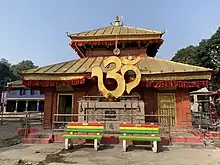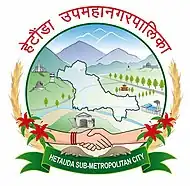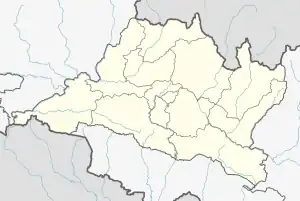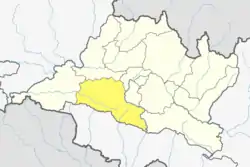Hetauda
Hetauda (Nepali: हेटौडा, pronounced [heˈʈʌu̯ɽa]) is a sub-metropolitan city in the Makwanpur District of Bagmati Province in central Nepal. It is the administrative headquarters of the Makwanpur District and the capital of Bagmati Province as declared by a majority (105 out of 110) of the Provincial Assembly Members on 12 January 2020.[1] It is one of the largest cities in Nepal. At the time of the 2015 Nepal census, it had a population of 153,875 people.[2] The city had a population of 195,951 in 2021.[3]
Hetauda
हेटौंडा | |
|---|---|
   Clockwise from top: Sahid Smarak,Bhutandevi Temple,Manakamana Temple | |
 Seal | |
 Hetauda Location in Nepal  Hetauda Hetauda (Nepal) | |
| Coordinates: 27°25′N 85°02′E | |
| Country | Nepal |
| Province | Bagmati Province |
| District | Makwanpur |
| Government | |
| • Type | Mayor–council |
| • Mayor | Mina Kumari Lama (Unified Socialist) |
| • Deputy Mayor | Rajesh Baniya (NC) |
| Area | |
| • Total | 261.59 km2 (101.00 sq mi) |
| Elevation | 345 m (1,132 ft) |
| Population (2021) | |
| • Total | 195,951 |
| • Rank | 10th (Nepal) 4th (Bagmati Province) |
| • Density | 750/km2 (1,900/sq mi) |
| • Ethnicities | Bahun Chhetri Tamang Newars Magars |
| Time zone | UTC+5:45 (NST) |
| Post code | 44100, 44107 |
| Area code | 057 |
| Website | www |
History

It is believed that Hetauda got its name from Hidimba, a demonic queen who ended up marrying Bhimsen as per a story in Mahabharat. The fact that there is a place called Bhimphedi just as the plains of Hetauda meets the mountains can be considered a manifestation of this belief. During the Rana regime in Nepal, there was a history of cars being carried by porters to Kathmandu through Bhimphedi.[4]
Economy
The Hetauda Industrial District (HID) is one of the biggest industrial districts in Nepal,[5] housing large, medium-scale, and cottage industry. It was established in 1963 under technical and financial assistance of the government of the United States of America.
Demographics
At the time of the 2011 Nepal census, Hetauda Submetropolitan City had a population of 154,660. Of these, 61.9% spoke Nepali, 26.4% Tamang, 4.8% Newar, 2.2% Bhojpuri, 1.4% Maithili, 1.0% Magar, 0.4% Chepang, 0.3% Gurung, 0.3% Hindi, 0.2% Tharu, 0.2% Urdu, 0.1% Bhujel, 0.1% Lepcha, 0.1% Rai, 0.1% Rajasthani and 0.2% other languages as their first language.[6]
In terms of ethnicity/caste, 31.1% were Tamang, 26.6% Hill Brahmin, 13.8% Chhetri, 8.8% Newar, 4.3% Magar, 3.1% Kami, 2.0% Rai, 1.0% Musalman, 0.9% Damai/Dholi, 0.9% Kathabaniyan, 0.8% Gurung, 0.7% Chepang/Praja, 0.7% Sarki, 0.6% Danuwar, 0.5% Tharu, 0.3% Gharti/Bhujel, 0.3% Sanyasi/Dasnami, 0.3% Thakuri, 0.2% Kalwar, 0.2% Kanu, 0.2% Marwadi, 0.2% Teli, 0.2% other Terai, 0.2% Yadav, 0.1% Terai Brahmin, 0.1% other Dalit, 0.1% Dhanuk, 0.1% Ghale, 0.1% Hajjam/Thakur, 0.1% Kayastha, 0.1% Koiri/Kushwaha, 0.1% Kumal, 0.1% Kurmi, 0.1% Limbu, 0.1% Majhi, 0.1% Rajput, 0.1% Sonar, 0.1% Sudhi, 0.1% Sunuwar and 0.1% others.[7]
In terms of religion, 67.3% were Hindu, 27.9% Buddhist, 3.5% Christian, 1.0% Muslim, 0.1% Kirati, 0.1% Prakriti and 0.1% others.[8]
In terms of literacy, 78.7% could read and write, 2.2% could only read and 19.0% could neither read nor write.[9]
language in Hetauda
| Broad Ethnic Category | Sub Category[11] | Linguistic Family | Population Percentage |
|---|---|---|---|
| Khas (Hill/Pahari Caste Groups) | Khas Brahmin, Chhetri, Kami, Thakuri, Damai Sarki,Sanyasi/Dasnami | Indo-Aryan | 45.3% |
| Janajati (Hill Tribal Groups) | Magar,Tamang,Gurung, Sherpa,Rai,Limbu etc. | Sino-Tibetan | 38.6% |
| Newar (Kathmandu Valley Caste Groups) | Newari Brahmin, Shrestha, Tamrakar, Newar Buddhist, Maharjan, Rajkarnikar etc. | Indo-Aryan And Sino-Tibetan | 8.8% |
| Madeshi (Terai Caste Groups) | Yadav, Maithil Brahmins, Chamar, Kushwaha, Musahar, Kurmi, Dhanuk etc. | Indo-Aryan | 2.9% |
| Muslim | - | Indo-Aryan | 1% |
| Adibasi (Terai Indigenous Groups) | Tharu, Rajbanshi, etc. | Indo-Aryan And Sino-Tibetan | 0.8% |
| Others | - | Indo-Aryan | 2.6% |
Attractions
One of the most popular attractions of Hetauda is Martyr Memorial Park,[12] or Sahid Smarak (Nepali: शहीद स्मारक), which was completed in 1994. The park honors Nepalese martyrs, from those who died in the British colonial wars to those who overthrew the autocratic Panchayat system in 1989. A series of sculptures of these martyrs sit on a large boulder; their faces were sculpted by student volunteers from Lalit Kala Campus. The park is also popular as a picnic spot and as an escape from busy city life. It has a swimming pool and a zoo that houses some endangered and some common wild animals, from monkeys to leopards.
Education
Education in Hetauda started with the establishment of Shree Bhutan Devi Secondary School (now Shree Bhutan Devi Higher Secondary School). Some notable education institutions and University include:
- Hetauda Campus
- Faculty of Forestry, (AFU)
- Makwanpur Multiple Campus
- Hetauda School Of Management
- Hetauda City College Zenith
- Narayani College
Climate
| Climate data for Hetauda (1976–2005 normals) | |||||||||||||
|---|---|---|---|---|---|---|---|---|---|---|---|---|---|
| Month | Jan | Feb | Mar | Apr | May | Jun | Jul | Aug | Sep | Oct | Nov | Dec | Year |
| Average high °C (°F) | 22.2 (72.0) |
24.8 (76.6) |
29.9 (85.8) |
33.3 (91.9) |
33.4 (92.1) |
32.6 (90.7) |
31.4 (88.5) |
31.7 (89.1) |
31.1 (88.0) |
29.5 (85.1) |
26.7 (80.1) |
23.7 (74.7) |
29.2 (84.6) |
| Average low °C (°F) | 6.8 (44.2) |
8.6 (47.5) |
12.6 (54.7) |
17.3 (63.1) |
20.9 (69.6) |
23.1 (73.6) |
23.4 (74.1) |
23.3 (73.9) |
22.2 (72.0) |
17.7 (63.9) |
12.1 (53.8) |
8.2 (46.8) |
16.3 (61.4) |
| Average precipitation mm (inches) | 18.3 (0.72) |
19.7 (0.78) |
23.8 (0.94) |
69.5 (2.74) |
180.8 (7.12) |
372.4 (14.66) |
686.6 (27.03) |
558.4 (21.98) |
374.9 (14.76) |
97.2 (3.83) |
12.2 (0.48) |
16.1 (0.63) |
2,429.9 (95.67) |
| Source: Agricultural Extension in South Asia[13] | |||||||||||||
See also
References
- "PA decides to call Province 3 Bagmati, with Hetauda as its permanent HQ". The Himalayan Times. 13 January 2020. Archived from the original on 28 November 2020. Retrieved 14 January 2020.
- "Nepal Census 2001". Nepal's Village Development Committees. Digital Himalaya. Archived from the original on 12 October 2008. Retrieved 9 December 2008.
- "Census Nepal 2021". censusnepal.cbs.gov.np. Archived from the original on 27 January 2022. Retrieved 22 February 2022.
- Hatuwali, Chandra Kumar. "Cars didn't carry people, people carried cars | Nepali Times Buzz | Nepali Times". archive.nepalitimes.com. Archived from the original on 6 April 2020. Retrieved 6 April 2020.
- "Industrial Districts". Archived from the original on 1 July 2020. Retrieved 13 April 2020.
- NepalMap Language
- NepalMap Caste
- NepalMap Religion
- NepalMap Literacy
- "NepalMap profile: Hetaunda Sub-Metropolitan City". NepalMap. Retrieved 15 July 2022.
- "NepalMap profile: Kathmandu Metropolitan".
- "Martyrs' Memorial Park turns tourist spot". GorakhaPatra. Archived from the original on 25 May 2021. Retrieved 13 April 2020.
- "TEMPORAL AND SPATIAL VARIABILITY OF CLIMATE CHANGE OVER NEPAL (1976-2005)" (PDF). Agricultural Extension in South Asia. Archived from the original (PDF) on 13 October 2023. Retrieved 14 October 2023.
